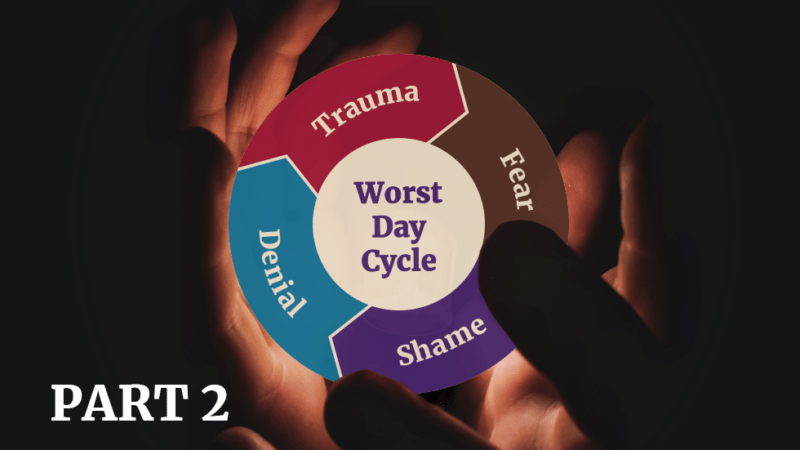Today’s Best Day Blog article is here to help you on your journey to healing from the past, gain Emotional Authenticity, and love and accept your perfect imperfections. This is part two of my 5-part series about how to heal The Worst Day Cycle, and here I’m going to share the 7 things we need to know about stage 1 of the cycle, trauma:
1: Knowing what trauma is
So, let’s start with the definition. Most people would define trauma as only those events that are very severe, like physical or sexual abuse. However, I have concluded that trauma is any life event that creates a harmful or hurtful emotional experience. I have concluded this because of what happens to us when we have negative emotional experiences. Even the slightest emotional injury creates a very damaging response to the individual, regardless of race, gender, or socioeconomic status. Those responses create lifelong negative consequences that impact a person’s relationships, careers, hobbies, friendships, families, and health. Most of society has minimized this fact to our great detriment. I would like to change that.
2: What happens to us during trauma
As Bessel van der Kolk, a leading expert on trauma, says, ‘Trauma produces a recalibration of the brain’s alarm system, an increase in stress hormone activity, and alterations in the system that filters relevant information from irrelevant.‘ This is the fight or flight system. For example, The brain’s alarm system or fight or flight response activates when we experience something new, For example, a possible new definition for trauma? Our brain and body are repeatedly having a chemical reaction to even the slightest emotional event.
Any stressful or fearful event actually changes the physical makeup of who we are. This is why I define them as traumatic because they alter us. And the more we experience them, the more the brain and body degrade.
Peter Levine, another powerhouse in this field of expertise, says
‘Trauma becomes inscribed as deep impressions carved into the body, brain, and mind, as well as in psyche and soul. It is critical to appreciate just how trauma becomes riveted in the body’s instinctive reactions to a perceived threat; how it becomes fixated in certain emotions, particularly those of fear, terror, and rage, as well as in habitual affective mood states such as depression, and loss of vital energy; and finally, how it plays out in various self-destructive and repetitive behaviors.‘
This is part of what led me to The Worst Day Cycle – because when we experience adverse emotional events, it leaves a deep imprint on all of us, which our brain and bodies get stuck repeating. The critical distinction I am making about trauma is that you can’t grade it. Contrary to what the majority of people believe, all trauma is bad.
3: What creates it?
The most significant source of all of our trauma is our childhood. Unfortunately, none of us leave childhood unscathed. The Adverse Childhood Experience Study (ACE) shows that two-thirds of us have experienced childhood trauma. Sadly, our culture promotes toxic levels of denial around this truth. Many people find it difficult to admit our caregivers hurt us, and we wound our own children. Because we lack Emotional Authenticity, it induces trauma to recognize these truths.
In addition to the ACE study, MRI studies of pregnant women found that stress during pregnancy literally changes the DNA makeup of the child instantly. Pregnancy is an emotionally overwhelming experience and responsibility. Studies show that maternal stress, depression, and exposure to partner violence affect infants before they’re even born. The experience of birth, going from the warmth and safety of the womb, into a world with noise, light, and sound is emotionally traumatic.
Parents are not to blame
The primary way we experience trauma is through parenting, and many people can find this difficult to accept because it can insinuate that I am blaming our parents. As I always say, this isn’t about blame, and it is about responsibility. We are all human. Therefore, we all make mistakes. That means that logically, all of us will be hurtful not by choice but by the nature of being human.
Blame says, ‘You did something that you could’ve done differently, so you are at fault.’ But responsibility says – ‘Yes, I played a part in this but not deliberately. My intent was pure. But I recognize that I was perfectly imperfect because of the lack of information and teaching, and there were consequences, and because I love my child, I accept those consequences.’ Loving your child is taking responsibility for your part in what your child is going through in their adult lives. The most hurtful parents are those who shun any responsibility and place all the blame and burden on the child – importantly, even those parents are not doing this maliciously. They are simply stuck in their unhealed childhood trauma and haven’t gained the Emotional Authenticity to be able to see it.
Gabor Mate, another expert in parenting dynamics, addiction, authentic self, and Emotional Authenticity, says
‘ Of all environments, the one that most profoundly shapes the human personality is the invisible one: the emotional atmosphere in which the child lives during the critical early years of brain development.‘ This timeframe is pre-birth to 7 years old, which means the emotional environment we provide as parents is crucial to our children’s outcomes, so we are responsible but not to blame.
Bruce Lipton, who is a cell biologist and expert in this field, says
‘Young children carefully observe their environment and download the fundamental behaviors, and feelings, of their parents directly into their subconscious memory. As a result, their parents’ behavior and feelings become “hardwired.” into the subconscious mind, those behaviors, and feelings control our biology for the rest of our lives, or at least until we make the effort to reprogram them.’
This is The Worst Day Cycle! We become our parents. Their feelings become the child’s feelings. If the parent is not healing, the child can’t heal because they become hardwired from whatever the parent’s emotional condition is. This is why most of us are simply replaying our lives unconsciously, making the same mistakes, thinking the same thoughts, and experiencing the same things because we have not made an effort to heal the pain from the past.
Parenting experts Foster Cline and Jim Faye, who created the world-renown parenting style of “parenting With Love & Logic say,
‘Whenever we order our children to “Shut up!” “Stop arguing!” or “Turn off the television!” we’re sending a message that slashes into their self-concept. when we give children orders, we are saying: “You don’t take suggestions.” “You can’t figure out the answer for yourself.” “You have to be told what to do by a voice outside your head.”
When we tell our kids what to do, we are telling them we think they are incapable or stupid. We say we know better, you don’t know what you’re doing, and I don’t believe in you. To expect your child to then be able to go out into the world confidently, believing they can do things on their own, is unreasonable.
Now, reflect on your own life – are you a people pleaser? Do you know your own needs and wants? Do you have a strong sense of self? If not, that is trauma! You were stripped of the ability to think for yourself. Told what to do. Unable to make your own decisions. But, rather than being a ‘big,’ dramatic event that caused trauma, it was the simple day-to-day normal parenting, and this is exactly what I am here to share and shed light on – that trauma is happening all the time and everywhere because, as a society, we do not teach Emotional Authenticity.
4: What It leads to – Illness and Disease
The ACE studies show that dysfunction in childhood plays a significant role in chronic diseases, such as heart disease, cancer, stroke, and diabetes – the most common causes of death and disability in the United States. Our emotional trauma history primarily determines our health! Study after study has shown that nearly every illness and disease has an emotional element. The CDC estimates the number to be between 85 and 95%.
This is why the most effective treatment for many conditions is Emotional Authenticity and learning how to heal emotional trauma. Unfortunately, medical schools are run and funded by the pharmaceutical industry in today’s society. They have a vested interest in our doctors only learning biology and only prescribing medications. Our doctors don’t even take a single class on emotions or trauma or their profound direct correlation to illness and disease. As a result, our doctors are woefully under-educated on the entire illness and disease model.
5: How Do You Know If You Experienced Trauma
There are four questions that I’ve devised that will help you to determine if you’ve experienced trauma in your childhood and will also show if you’re stuck in The Worst Day Cycle.
1- As a child, whenever you felt sad, angry, or scared by anything your parents said or did, you could not discuss it with them. The fantastic Gabor Mate’ gets credit for this question.
2- You have kept secret any thoughts, feelings, beliefs, or behaviors from your parents because you fear their disapproval, judgment, or rejection. The fear of rejection, abuse, or abandonment is too strong to be fully authentic, and the trauma bond between parents and children is too strong to admit perfect imperfections.
3- You can’t sit with your parents and openly discuss their perfectly imperfect parenting? Even worse, you’re afraid to mention the subject? If you’re a parent reading this, you might be finding it very difficult to accept responsibility, but this is simply because, as a child yourself, you were stripped of your own voice, and the child inside of you is fearful of facing up to your own parents. To accept what is being said in this article is a threat to the whole emotional upbringing of your childhood – the one that said you must keep your parents happy and keep secret your own trauma, pain, and sadness to get their love and protection.
4- You excuse, minimize or justify your parent’s perfectly imperfect parenting of you. Did your parents hot it yell at you? Do you find yourself defending the behavior by saying it was tough love? It was good for you? It made you strong and tough, or even worse, you deserved it? Minimizing our parent’s behaviors makes it more likely that we will condone the poor behaviors of toxic people like narcissists. You will overlook the behavior in the same way you did as a child. There is a direct, irrefutable connection between the two. Your adult relationship struggles and dysfunctions directly correlate to the care or lack of care you experienced as a child.
6: Why do we have to heal it?
Alice Miller, the Swiss psychologist, explains it well when she says,
‘We cannot really love if we are forbidden to know our truth, the truth about our parents and caregivers as well as about ourselves. We can only try to behave as if we were loving. But this hypocritical behavior is the opposite of love. It is confusing and deceptive, and it produces helpless rage in the deceived person. So, whether it is ourselves or our parents who avoid this mourning it means that we remain at our core the one who is unloved, for we have to dislike everything in ourselves that is not wonderful, good, and clever. Thus we perpetuate the loneliness of childhood: We despise our weakness, helplessness, uncertainty—in short, the perfectly imperfect child in ourselves, our parents, our children, and in others.’
Being forbidden to live in truth is at the core of The Worst Day Cycle. This creates the inability to have Emotional Authenticity, which is why trauma is so significant – because it starts everything. The ability to not blame our parents but hold them responsible is what truth can offer. When we can speak openly about the pain from the past we will then behave and love authentically.
This false love causes people to be in unhealthy relationships. For example, narcissists, because it creates dual deception and manipulation. On one side, the narcissist is being manipulative and most often knows what they are doing is unkind. But the person with the narcissist is also manipulating. They are so desperate for some form of attention and a feeling of love. They use blame and victimhood to gain control and power.
We’re all doing the best we can, and no one is to blame. The goal is to take responsibility for these actions in our lives. That is when healing can begin.
7: The Worst Day Cycle
All we ever do is recreate our trauma – in every aspect of our life – this is The Worst Day Cycle
As Dr. Joe Dispenza says, because of the chemical release that happens when we experience trauma in childhood
‘We choose to remain in the same circumstances because we have become addicted to the emotional state they produce and the chemicals that arouse that state of being.‘ This happens when we go through trauma – it creates an emotional chemical addiction that creates a cycle.
Bessel van der Kolk says
‘Scared animals return home, regardless of whether a home is safe or frightening. Somehow the very event that caused them so much pain had also become their sole source of meaning. They felt fully alive only when they were revisiting their traumatic past’. This is everybody! This is why gallops polls have shown 93% of people on this planet are unhappy because everybody is simply living The Worst Day Cycle day in and day out. To recover, we must become trauma-informed. Doing so brings us into reality on the parenting we had, and the parenting we give as caregivers.
The next step in our journey to healing The Worst Day Cycle is to discover how the chemicals of trauma create the addictive fear response. In the meantime, here are some resources to help you begin the Emotional Authenticity healing journey.
Pick the one that suits your needs best!
1- My Book, Your Journey To Success
2- My Complete Emotional Authenticity Method
3- My Perfectly Imperfect Private Group
4- My Private Coaching
Learn more here:




